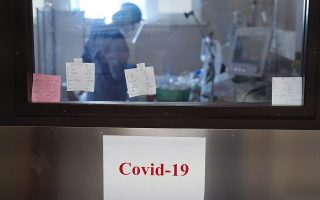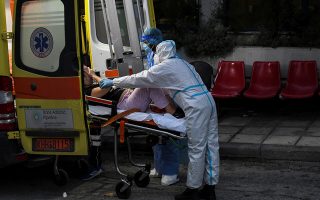The ‘me’ against the ‘we’

Eleni Grammatopoulou is a food service worker at the Papanikolaou Hospital in Thessaloniki, northern Greece, responsible for bringing food to the patients on the Covid-19 ward. Kathimerini had spoken to her this time last year on the subject of the pandemic. She was happy because a 97-year-old patient had beat the disease and been discharged.
“Patients leaving the hospital ask to see my face. ‘I want to remember you, because you sang to us every time you brought us our meals,’ they say. So, I stand a few meters away from them, take down the mask for a couple of seconds and smile. These are the moments that give me comfort over the losses we experience. We had a 52-year-old, Dimitris, who had decided to adopt a stray puppy as soon as he got better. He died a week later.”
A year after that interview, the pandemic continues to rage like a torrent, sweeping everything away in its wake. Greece’s death toll on November 20, 2020 was 2,406. Today it has passed 18,000. And behind these relentless numbers there are people: mothers and fathers, spouses and partners, children, siblings, friends who died too soon, leaving an unbreachable void. We may never know their stories, but we know how they died: in an intensive care bed, struggling for breath, having exchanged a few words with their loved ones over a cellphone.
The lights and trees are going up all over Greece, but for more than 18,000 families, this will be a dark and bitter holiday season, shrouded in loss. And there’s a new variant on the march: Omicron, a global threat demanding a collective response. Nevertheless, there are those who insist on looking away from reality. They doubt the vaccines which may not protect us against the virus 100% but are our only credible shield against it right now; they spread conspiracy theories; they hatch schemes to wriggle their way out of restrictions; they fire barbs at anyone who has the temerity to speak of individual responsibility and social accountability; they undermine the collective effort; they scorn the dead.
In what way are these people different to the workers at the factory in Keratsini who walked past the dying and dead Olga, pretending they could not see her or kicking her to see if she was alive?





